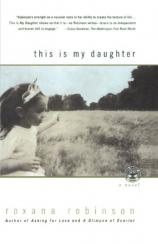Reading Group Guide
Discussion Questions
This is My Daughter: A Novel

1. Are Peter and Emma both justified in ending their first marriages? When Peter tells Amanda that he and Caroline are separating, he says'. "It's not your fault, and it's not your mother's fault. It's no one's fault." Emma says: "When you get divorced you never feel it's your fault....Everyone feels they've been driven to it." Is Emma "driven" to divorce? Is Peter? To what degree can blame be assigned to one partner when a marriage ends? Do you feel sympathy for Caroline and/or Warren? Why or why not?
2. How does Emma's relationship to her father -- and her parents' relationship to each other -- affect Emma's choices and influence her marriages? Everett Kirkland blames his daughter for the failure of her first marriage. "You have surrendered the right to take a moral position on things," he tells Emma. "You have broken your promise, destroyed your marriage, and deprived your child of a father." Do you find his criticism harsh and naive, or principled? Is divorce always selfish when children are involved? Is it nobler to sacrifice individual happiness to keep a family intact at all costs? Or would the emotional strain of such an arrangement be as damaging to a child as divorce?
3. Early in the novel both Amanda and Tess have nannies who help: care for them. Compare and contrast the nature of Tess's relationship with Rachel and Amanda's relationship with Maeve. How do these relationships reflect the girls' personalities and their family lives? How do they influence the girls' reactions to divorce?
4. As a young girl, Amanda feels comforted by the boundaries Maeve establishes -- her "little rules about everything in life." Yet when Emma later tries to impose rules on Amanda at Marten's Island, Amanda is resentful and hostile. Why? Discuss the theme of rule-breaking throughout the book. Does the book as a whole suggest that rules are necessary, or made to be broken? Or both?
5. Amanda is portrayed as a troubled child even before Peter and Caroline separate. Why is Amanda so uncommunicative as a young girl? Are her rebellious teen years solely attributable to her parents' divorce? How do you view Amanda? Do you find her to be neglected or Spoiled? Deprived or undisciplined? Victimized or abusive? How would Amanda's life have been different had Peter and Caroline stayed together? Or had Peter left, but not remarried?
6. "Children have no choice: they are at our mercy," Emma thinks to herself early in the novel. Do the events of the book support this statement? Or are Peter and Emma equally at the mercy of their children?
7. Over the years, Amanda continually thwarts Emma's attempts at closeness. Do you think Emma's efforts are sincere? Would a different approach have been more successful, or would Amanda have been implacable regardless? How would you try to get through to Amanda if you were in Emma's shoes? Compare Emma's strained relationship with her sister Franck to her difficulties with Amanda. Are there parallels between the two relationships?
8. Emma admits that she doesn't love Amanda but wishes that she could. "It was so baffling, being a stepmother, so difficult to figure out," Emma thinks. Discuss the proper role of a stepparent. Should a stepparent be a friend? A disciplinarian? A parent? All three? Does the role depend upon each child's age and temperament? Do you think it is harder to be a stepmother than a stepfather? Does the book portray stepparenting as a no-win situation? After reading this novel, would you argue that it is better for a child to be raised by a single parent or by a parent and stepparent?
9. Ironically, Tess displays the most tolerance for Amanda, despite her stepsister's cruelty and indifference toward her. On numerous OCCasions, Tess defends Amanda and tries to befriend her. Why does Tess have sympathy for Amanda? Why isn't she more threatened by Amanda? Why does Tess have an easier time adjusting to the remarriage?
10. In Tess's hospital room after the car accident, Peter walks in on Emma and Warren in an embrace. Emma then harshly rebukes Peter when he touches Tess. "The complicity Was gone, Peter and Emma were no longer allies," Robinson writes. What major themes of the book does this scene illustrate? Hove did you feel about Emma's rejection of Peter after the accident? Did you think it was fair or unfair, or simply inevitable? For which character did you feel the most sympathy after the accident? Before the accident?
11. The book ends on a hopeful note. Amanda reaches out to her father, Tess shows signs of recovery, and Peter and Emma renew their commitment to one another. To what degree does the accident serve as a catalyst for growth and communication? Do you think the accident -- though tragic -- strengthens Peter and Emma's marriage? Do you think reconciliation would have been possible had Tess died in the accident? If Amanda, rather than Tess, had been gravely injured, how would Peter and Emma have reacted?
12. What kind of relationship do you think Emma will have with Amanda ten years after the book ends? How do you predict their relationship will evolve? When Tess emerges from her coma and understands what has happened, how do you think she will respond to Amanda? Do you think Peter and Emma's marriage will last? Why or why not?
This is My Daughter: A Novel
- Publication Date: September 16, 1999
- Paperback: 416 pages
- Publisher: Touchstone
- ISBN-10: 0684864363
- ISBN-13: 9780684864365







